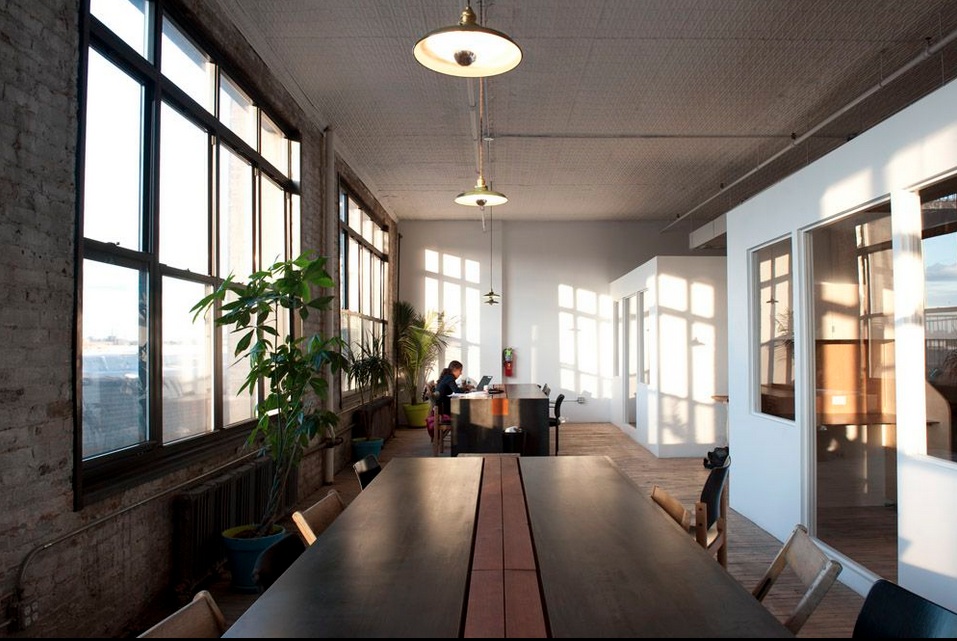Q&A: Jason Goodman, CEO, 3rd Ward

 Jason Goodman predicts 3rd Ward will be a household name by 2018. That’s a bold goal. But the business model for his workspace-meets-classroom in Brooklyn is uncannily contemporary.
Jason Goodman predicts 3rd Ward will be a household name by 2018. That’s a bold goal. But the business model for his workspace-meets-classroom in Brooklyn is uncannily contemporary.
He’s built a space to support the work of local artists and “makers” (that's hipster for craftspeople). He’s hired said artists and makers to teach each other how to make things. And more recently, he’s completed the cycle by focusing on how to sell said things to a global market.
The 20,000 square foot multi-disciplinary coworking space includes a full wood shop, metal shop, photo studio, and jewelry studio. As Goodman put it, “This is going to be a year of building building building and learning how to grow.” Indeed. A replica of the Brooklyn space is opening in Philadelphia this March while building continues on the new 6 million dollar culinary space in Brooklyn, set to open in October of this year.
Since 3rd Ward opened in 2006, Goodman has hardly been able to meet the demand for an education that doesn’t involve degrees, elitist tuition fees, or a competitive application process. I sat down with Goodman to find out how he has what every smart entrepreneur wants.
How did 3rd Ward get started?
I grew up in Georgia and I was always making things as a kid. Whether it was building a fort or making art, I always found making things a very gratifying and human experience. But I also didn’t like defining things as art. I just wanted to embrace the handmade.
I went to art and design school. I worked in the fashion and photography industry for a while. And eventually I moved to New York in 2004 and started a design-build firm doing commercial interiors. During that process I started to have the beginning ideas of 3rd Ward.
I wanted to be part of a community that celebrated making. A community with a place – so everyone didn’t have to have a wood shop, a whole metal shop, and a whole textiles studio. I actually couldn’t believe it didn’t exist.
Originally we were very focused on providing facilities and community. The class program, which is now the biggest part of our business and culture – came as an unexpected phenomenon. We initially offered classes more to teach people how to use our space. But we just couldn’t make classes fast enough.
When we opened in 2006 we imagined being a membership community. We quickly became a maker education center. That was our big trajectory. Now we think of it as ‘learn, make, sell.’
Once our members have learned their craft, they can continue to stay at 3rd Ward without having to buy their own equipment. And one of the big things we’re doing in 2013 is helping people reach a marketplace.
You’ve been profitable since you started. Your annual revenues two years ago were around 1.5 million and you’re now in the process of expansion. Has that success stayed the course?
I haven’t seen December’s numbers yet but I think we came in around 4 million. So there’s been a lot of growth. Most of that growth is coming from the demand for our type of education. You don’t have to apply. You don’t have to have some kind of degree. You just come to the website, and if you find what you’re looking for, you’re in. You start making something very quickly with not a lot of bullshit.

Let’s talk about freelance life and the changing landscape of the creative market. Have you seen big changes in recent years?
Massive massive change getting bigger every year, and we’re right in the middle of it. The idea that a kid getting out of college today – 22-years-old – will get a job at IBM, work their for four decades and retire is laughable. That’s a huge change. That’s industrial society up until the last decade.
People now have the technology and resources to get so much more done with so much less. You’re seeing freelancers and small-scale groups leveraging technologies that would have acted as gatekeeper to success before. For example, you can go on Etsy and sell your product (that you made in your apartment or at a place like 3rd Ward) to a global marketplace for basically free. Makers may have been passionate about a product or a craft, but had no way to reach an audience outside their local community until fairly recently. That’s a huge change. It’s a huge economy.
We’re getting to the point now where it’s natural and obvious, but I think that over the last few years it was turbulent. But we see this – we live it everyday. We see how our members are able to learn something they wanted to do, put it into practice, and actually reach an audience immediately. It’s a very different world.
Are there any notable stories of people using 3rd Ward as a jumping off point to wider professional success? There are so many disciplines represented in this big working space, have interesting collaborations come out of this?
I mean there are so many. RE-CO BKLYN is a great example. They started off as incubating members using our woodshop to make custom furniture. Eventually they started teaching at 3rd Ward. Then they got so busy they had to build their own shop upstairs. They were doing custom furniture when they realized they couldn’t find the local hard wood their customers wanted – and they wanted to use sustainable stuff. So they went out to all these small towns in upstate New York and said, “When your trees fall down in a storm, or you have to rip some out to build a road, call us and we’ll come take them for you for free.” These big old growths usually just get turned to wood chips and tossed out. They made a contract with the city to come pick up the wood. So now they bring these huge beautiful logs back to 3rd Ward. They rented an area across the street from us and made a kiln out of a shipping container. They’re milling sustainable products right across the street from 3rd Ward. You can buy whole slabs of kiln-dried lumber and their making like 10s of 1000s of boards a month. It’s amazing. It’s sustainable and it’s a great product. A 3rd Ward success story.
It’s a great example because it hits on the intersections of maker culture – it’s an ideology in and of itself, it’s not just about the economy.
I think that’s a really important point. There are really two things. There’s a macro economic shift and there’s a cultural shift. I think the cultural shift started with food.
Organic farmers of the 80s and 90s said, “Hey, it doesn’t have to be this way. You can actually know your farmer. Know how they grow your food and what their philosophy is.” Now people are saying, “What about the clothes that I’m wearing? What about the shoes on my feet? What about the furniture, where does it come from? What is the impact sociologically, economically, and environmentally?”
This is a good segue to talk about the new culinary space.
It’s basically the exact same model as our maker space. It was designed with the same philosophy and passion for making things locally and selling them globally. There will be an incubator kitchen that you can rent, or pay a membership fee to use. There will be hundreds of classes from pickling to canning to baking to butchering to perfume. We’re also really into non-food based plant derivative products. Like artisanal skin creams or perfumes. We’ll have a lab for that. There will be a food technology lab for those into urban farming techniques. We’ll also have an event space and a co-working space.
You’re also opening a new 3rd Ward space in Philadelphia. When is this all set to open?
Philadelphia is set to open in March. For the culinary space we’re shooting for October of 2013. We just finished planning and now we have to build the place. This is going to be a year of building building building and learning how to grow.
We are also always looking for teachers. One of the cool things that 3rd Ward became, which we didn’t initially understand but saw happen very quickly, was a way to unlock all this local latent knowledge and commerce through teaching.
We go into a neighborhood and all of a sudden we have 150 teachers sharing knowledge with thousands of people, earning an income, and amplifying the knowledge and skill base that a community has.
This is a cliché question but I still love asking it. What’s your vision for 3rd Ward in 5 years?
If we do what we’ve come here to do, in 5 years 3rd Ward will be a household name. There will be 3rd Wards in every major city in America – maybe even some international cities. And you’ll also be able to use our website to learn online and to buy and sell amazing products.
How confident are you?
I am very confident. We know our business. The user economics are simple. The marketplace and desire is real. People want to make things. They want to be part of a community around that. I see us as an alternative to a college education and a place to help people move on multiple career paths. The trend is here to stay. This is a permanent and massive shift and 3rd Ward has a place in it.
This post was originally published on Smartplanet.com